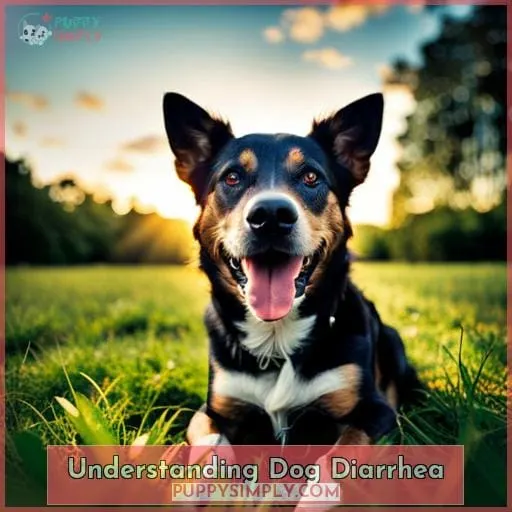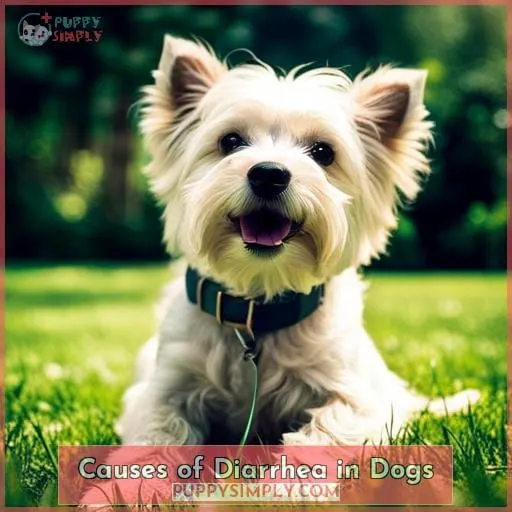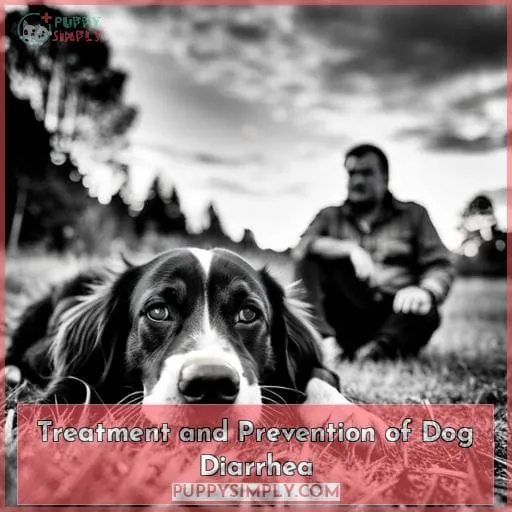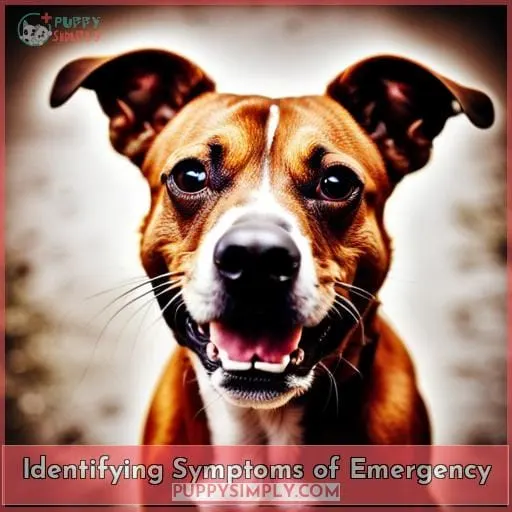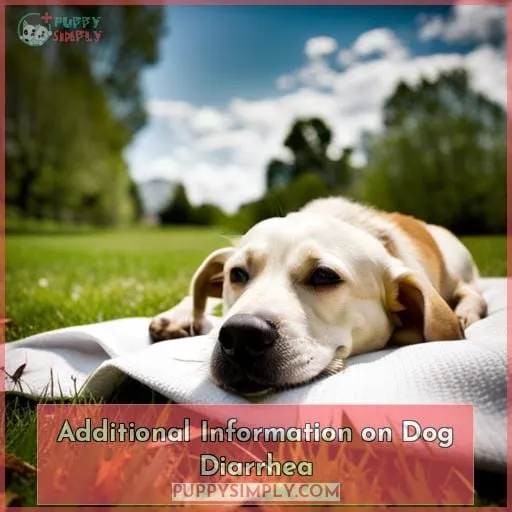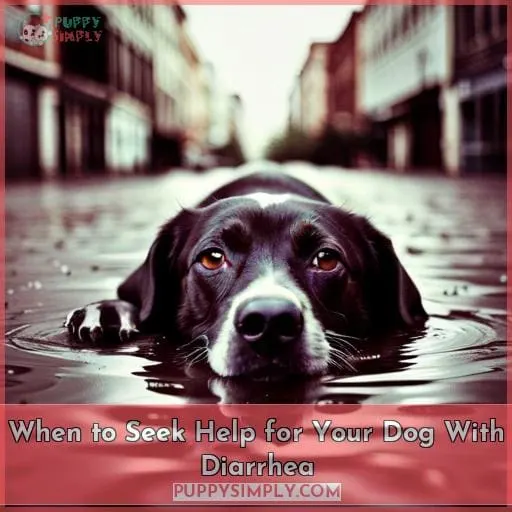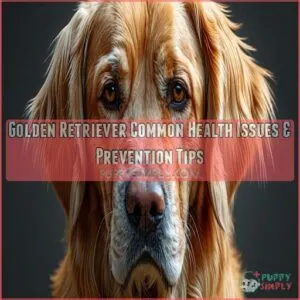This site is supported by our readers. We may earn a commission, at no cost to you, if you purchase through links.
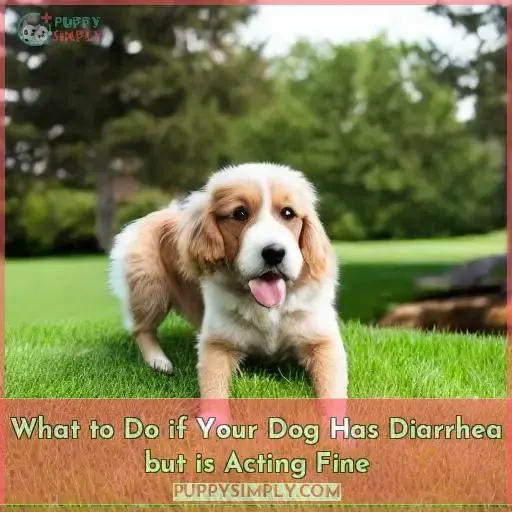 If your pet is suffering from diarrhea and still acting normally, you may be feeling concerned about their health. As a dog owner, it can be difficult to know how best to care for them when they don’t show any obvious signs of distress.
If your pet is suffering from diarrhea and still acting normally, you may be feeling concerned about their health. As a dog owner, it can be difficult to know how best to care for them when they don’t show any obvious signs of distress.
Take the case of Stella – her owners noticed that she had loose stools but was otherwise behaving as normal.
In this article, we will explore what causes diarrhea in dogs, treatment options available, and symptoms which indicate an emergency situation requires veterinary attention
Table Of Contents
- Key Takeaways
- Understanding Dog Diarrhea
- Causes of Diarrhea in Dogs
- Treatment and Prevention of Dog Diarrhea
- Identifying Symptoms of Emergency
- Additional Information on Dog Diarrhea
- When to Seek Help for Your Dog With Diarrhea
- Frequently Asked Questions (FAQs)
- What should I do if my dog’s diarrhea persists for more than 48 hours?
- What is the best diet to feed my dog with diarrhea?
- Can I give my dog human medication if it has diarrhea?
- Is there anything I can give my dog to prevent diarrhea?
- Is there an online resource for pet owners with questions about dog diarrhea?
- Conclusion
Key Takeaways
Diarrhea in dogs can be caused by various factors such as digestive problems, stress, parasites, infections, and irritable bowel syndrome. It is important to seek professional veterinary care immediately to prevent dehydration, especially if the diarrhea persists for more than 48 hours or there are symptoms such as lethargy, fever, weakness, vomiting, and blood in stool.
Coping techniques such as diet changes, vet-prescribed medications, and stress management can help control symptoms and identify the underlying cause of diarrhea. Probiotics can improve digestion, immunity, and reduce inflammation, but their dosage should be asked from the vet.
Understanding Dog Diarrhea
Understanding the causes, types, and treatments of dog diarrhea can help you identify if your pup needs emergency care. Dog diarrhea is a common problem that can have many underlying causes such as digestive problems, stress and anxiety, parasites, or bacterial/viral infections.
There are three main types of canine diarrhea: acute watery, which is usually non-serious; acute bloody, which indicates serious issues; and chronic diarrhea lasting more than 48 hours.
Prevention methods include consulting a vet prior to treatment for an accurate diagnosis along with diet changes to bland foods like boiled chicken or white rice.
If anything seems wrong, it’s important to seek professional care immediately because dehydration due to both vomiting and diarrhea requires urgent attention even if all other symptoms appear okay on the surface level.
Causes of Diarrhea in Dogs
If your pup is experiencing diarrhea but seems otherwise fine, it could be the result of stress and anxiety, parasites, bacterial or viral infections, or irritable bowel syndrome. It’s important to consult with a veterinarian in order to accurately assess the cause, as each of these can have different treatments.
Stress and Anxiety
Be aware that stress and anxiety can cause your pup’s diarrhea, so make sure to look out for any signs of distress! Changes in appetite or behavior, as well as increased panting, could be stress signs.
Excessive barking or whining may be anxiety symptoms. Coping techniques, such as diet changes, vet-prescribed medications, and relieving the dog of any following stressors, will help alleviate these issues.
Parasites
Check if your pup has been exposed to parasites, as this could be the cause of their diarrhea. Common signs include intestinal upset and water loss. It is important to identify any parasites present in order to ensure proper treatment and prevention of further health issues.
Parasite control is essential for maintaining good health. Make sure you are up-to-date with preventative measures such as deworming or flea/tick treatments that can help keep parasites from entering your pet’s body.
Bacterial/Viral Infections
Keep an eye out for bacterial or viral infections as these can also be the cause of your pup’s diarrhea. Common signs include red, bloody stool, fresh blood in stools, and digestive tract issues.
To diagnose a bacterial infection, your vet will look for typical symptoms such as vomiting and fever, along with possible exposure to infectious agents. Viral infections are harder to identify due to their vast range of potential causes; they often require further lab testing for diagnosis.
Treatment may involve antibiotics if there is evidence of bacteria present or supportive care, which includes fluids and electrolyte balance, depending on the severity level of illness caused by the virus itself! Prevention strategies should focus on reducing contact with other animals that have known illnesses, and being up-to-date on vaccinations.
Irritable Bowel Syndrome
If your pup is exhibiting signs of digestive issues, it’s possible they are suffering from irritable bowel syndrome. This can be stress-induced, parasite-caused, bacterial-induced, or diet-related.
To treat the disorder and the dog’s diarrhea associated with IBS, you must first identify the underlying cause. A well-balanced diet that eliminates food intolerances may help alleviate symptoms.
It is important to seek veterinary advice if symptoms persist, as there may be an underlying issue that needs addressing, such as a gastrointestinal infection or blockage
Treatment and Prevention of Dog Diarrhea
If your pup is experiencing diarrhea, consulting with a veterinarian should be your first step. To help prevent or control the symptoms of dog diarrhea, try fasting for 12-24 hours and feeding them a bland diet of boiled chicken and white rice.
Consulting a Veterinarian
Reach out to your veterinarian right away for expert advice to help diagnose and treat the cause of your pup’s diarrhea.
- Seeking veterinary advice on available treatment options
- Recognizing symptoms and adapting the diet if needed, such as feeding skinless chicken or white fish with specially formulated dog food
- A plain diet of boiled rice or potatoes and lean protein may be beneficial in some cases. Home remedies like pumpkin can also offer relief from diarrhea.
Don’t hesitate – ensure that you get professional assistance so that your pup is soon feeling better!
Fasting
Take a break from feeding your pup for 12-24 hours to help reduce diarrhea. Fasting has many benefits, such as allowing the digestive system time to rest and promoting healthy gut bacteria. However, it should only be done if your dog’s mild diarrhea is not accompanied by other symptoms like lethargy or fever.
Ensure that hydration levels are kept up with water or doggie electrolytes during fasting periods. The best food choices include boiled chicken and white rice or sweet potatoes mixed with probiotics for added nutrition when starting back on regular meals after the fast period has ended.
Avoid using human medications such as Pepto Bismol without consulting a veterinarian first!
Bland Diet
To help your pup’s upset stomach, switch their diet to a bland one consisting of boiled chicken and white rice or sweet potatoes mixed with probiotics for added nutrition. It’s important to consider feeding habits, stress management, and the benefits of probiotics.
Home remedies such as rice water and pumpkin can also be effective for runny tummy issues. However, if diarrhea persists, it may be necessary to seek veterinary attention.
Probiotics
Consider adding probiotics to your pup’s diet, as they can help prevent and control diarrhea. Probiotic benefits include improved digestion, stronger immunity against viruses and bacteria, and reduced inflammation in the digestive tract.
Before administering any type of probiotic supplement or food source, be sure to ask your vet about the proper dosage for your dog’s size and age. It is important to monitor your dog closely after introducing a new type of probiotic into their diet, as side effects may occur in some dogs.
Powder supplements or fermented foods are available, but if these are not suitable, alternatives should be explored with veterinary advice first-hand.
Dehydration
Keep an eye on your pup, as dehydration is a real concern when dealing with diarrhea. Make sure to keep their water bowl full and check for signs of thirst. It’s important to follow veterinary advice before starting any kind of plain diet or remedy such as pumpkin or rice water, as fasting effects can worsen the situation.
Peanut butter should only be given in moderation since it’s one of the most common causes of canine diarrhea.
Identifying Symptoms of Emergency
If your pup has diarrhea, it is important to be aware of the symptoms that may indicate an emergency. Your dog could be exhibiting signs of lethargy, fever, vomiting, weakness, or dehydration. It would also be a cause for concern if there was blood in their stool or if the diarrhea followed a vaccine or medication administration.
Lethargy
Monitor your pup’s behavior for signs of lethargy, as it can be an indication of a more serious health issue. Diarrhea, signs of stress from parasites, may require prevention, while vaccine reactions or rice water could be solutions to the pup’s diarrhea.
Observe the dog’s stool and its color, as this helps identify any issues related to its immune system. Remember that dogs have delicate systems, so different types of diarrhea should be addressed quickly by your vet.
Fever
Check for signs of fever, as it can indicate that your pup is suffering from a more serious illness. Fever may be caused by parasitic infection or acute bloody diarrhea. Seek veterinary advice promptly if you suspect any health issues related to the pup’s diarrhea and its stool color.
Prevention is key. A good rule of thumb is to monitor changes in behavior, such as lethargy and fever, provide hydration, and consult a vet about treatment and risks associated with fever.
Vomiting
If your pup is vomiting, seek veterinary advice immediately as it could be a sign of a serious illness. Stress relief, bland diets, and pumpkin benefits are all important to consider when dealing with digestive problems in pups.
Rice water can help control diarrhea while much peanut butter should be avoided due to its potential for causing an upset stomach. Human medication should never be given without consulting the veterinarian first.
Black tarry stools may also indicate more severe health issues that require prompt attention from a professional.
Weakness
Pay close attention to any signs of weakness, as this could be a symptom of an underlying health issue related to your pup’s diarrhea. The causes and types of diarrhea can vary from stress and anxiety to bacterial/viral infections.
Veterinary help is advised for proper diagnosis and treatment plan, while home remedies may provide relief in mild cases.
Dehydration
Be aware that dehydration can be a serious side effect of diarrhea in dogs, so it is important to monitor your pup for signs like lethargy and fever. Factors to consider when diagnosing the most prevalent reason include fasting effects, probiotic benefits, and triggers such as human medication or doggie diarrhea.
Vet consultation is always advised before treating with home remedies or over-the-counter medications to prevent further complications from the puppy’s stool color changes or dehydration signs.
Blood in Stool
Monitor your pup closely for any signs of blood in their stool, as this could be an urgent indication of a more serious underlying condition. Changes in poop consistency, symptom severity, or dietary changes can indicate the cause, and it is important to check stress levels as well.
Seek veterinary advice on the best dog food to avoid the risk of diarrhea, and if there are different colored stools, further tests may be necessary.
Diarrhea Following Vaccine or Medication
If your pup experiences diarrhea following a vaccine or medication, seek veterinary treatment right away. This is commonly due to an excessive amount of vaccines and/or the dog’s delicate system reacting poorly to a certain medication.
To help manage stress levels, diet changes may be necessary for relief, along with home remedies like rice water or pumpkin puree.
Additional Information on Dog Diarrhea
If you notice that your pup has diarrhea, it is important to seek veterinary treatment if the symptoms persist for more than 48 hours. Additionally, consider consulting an online vet resource such as Petcube for advice and support in emergency situations.
You can also try home remedies like rice water or pumpkin puree to help ease their discomfort.
Seeking Veterinary Treatment
It’s essential to seek veterinary treatment if your pup’s diarrhea persists for more than 48 hours, as this could be a sign of something serious. Professional advice should be sought in particular cases to assess the risk and determine the best course of action.
Most common causes can usually be treated with diet management and certain medications or supplements, but emergency care may be needed depending on severity. To rule out parasites or bacterial infections, it’s a good idea to inspect the dog’s stool sample under a microscope.
Online Vet and Emergency Fund
You can use online vet services, such as Petcube, for timely advice and support. Alternatively, you can set up an emergency fund to help cover unexpected costs. In addition, there are several home remedies that may be beneficial in treating your pup’s diarrhea.
A bland diet of boiled chicken and white rice, appropriate lean protein sources, and pumpkin or rice water can be useful. It’s important to remember that your dog’s delicate system cannot tolerate spoiled food, so always feed them the best quality fare you can afford.
Veterinary advice is key when it comes to selecting the right diet for optimal health.
Home Remedies
Try a few simple home remedies to help your pup’s diarrhea. Feed them a fasting diet of boiled chicken and white rice or offer pumpkin remedy. Avoid giving human medication or excess peanut butter, as these can worsen your small-to-medium-sized dog’s stool.
Remember, the most important thing is to respect your dog’s delicate system and seek veterinary advice if needed.
See the table below for more information.
| Home Remedies | Benefits |
|---|---|
| Fasting Diet of Boiled Chicken and White Rice | Helps settle the digestive system |
| Rice Water | Soothes upset stomachs and replaces lost fluids |
| Pumpkin Remedy | Contains fiber which helps firm up stools |
Note: Always consult with a veterinarian before trying any new treatments at home
Different Colors of Diarrhea
Be aware that different colors of diarrhea can indicate various health issues. To assess the causes, recognize symptoms such as lethargy, fever, and weakness. Make dietary changes, such as fasting, and try home remedies like pumpkin remedy or boiled chicken and white rice to help your pup’s diarrhea.
Human Medication
Never give your pet human medication without consulting with a veterinarian, as it can have harmful side effects and worsen the condition.
- Provide the nutritional needs for optimal health.
- Seek medical intervention if symptoms persist.
- Implement stress management and dietary changes such as fasting or simple carbohydrates like boiled chicken and white rice to help control their small intestine.
- Monitoring the dog’s stool will also assist in keeping them healthy from any further complications related to their delicate system!
Risk of Dehydration
You should be aware of the risk of dehydration, especially with vomiting and diarrhea. Monitor your pup’s symptoms to ensure their dehydration levels don’t reach dangerous heights. Diet changes, such as fasting or simple carbohydrates, can help control their small intestine.
It’s essential to monitor your dog’s stool too! Vet advice is key for providing stress relief to ensure proper health. Implementing these strategies will assist in keeping them healthy from any further complications related to their delicate system.
When to Seek Help for Your Dog With Diarrhea
Your pup’s diarrhea is a warning sign that something may be wrong. While it can just be a harmless case of digestive distress, if your dog’s stool has been loose for more than 48 hours or includes other symptoms such as lethargy, fever, vomiting, and weakness, then you should seek veterinary advice immediately.
It is important to remember that the small intestine works differently in dogs compared to humans, so what might work for one species will not necessarily have the same effect on another. The best course of action when dealing with your dog’s diarrhea depends on its cause and severity – there are various treatment options available depending on what diagnosing tests show up.
Your vet may recommend fasting for 12-24 hours followed by a bland diet like boiled chicken and white rice. They could also advise specially formulated food products designed to help treat or prevent diarrhea from recurring in future episodes.
If your dog has diarrhea but is acting fine, it still pays to take note of any changes in their behavior since this could indicate whether things are getting worse internally even if they appear okay externally.
Sudden weight loss or dehydration due to excessive bouts of vomiting/diarrhea warrant immediate attention from your local pet clinic as these conditions require medical intervention before things deteriorate further down the line.
You should always keep watch over any signs indicating emergency – blood-stained stools being chief among them – regardless of how mild you think their diarrhea may seem at first glance so you know when exactly professional assistance needs seeking versus relying solely on home remedies (such as giving plain diets like boiled rice/potatoes & lean proteins).
Frequently Asked Questions (FAQs)
What should I do if my dog’s diarrhea persists for more than 48 hours?
If your dog’s diarrhea persists for more than 48 hours, it is important to seek veterinary advice immediately. Delaying could be dangerous as dehydration may occur, and further complications could arise.
What is the best diet to feed my dog with diarrhea?
A bland diet of boiled chicken and white rice is the best way to help your pup with diarrhea.
Can I give my dog human medication if it has diarrhea?
It’s not recommended to give your dog human medication for diarrhea without consulting a veterinarian first. Allusions can add an enjoyable and engaging touch to the answer while maintaining a professional, accurate, and objective tone.
Is there anything I can give my dog to prevent diarrhea?
Research shows that up to 25% of dogs suffer from digestive problems. To prevent diarrhea, consult a veterinarian for specially formulated foods and probiotics.
Is there an online resource for pet owners with questions about dog diarrhea?
Yes, Petcube’s Online Vet is a perfect resource for pet owners with questions about dog diarrhea. You can receive accurate advice from experienced veterinarians in an engaging style that promotes safety and belonging.
Conclusion
It’s important to keep an eye on your dog when they have diarrhea. If your pet appears lethargic, has a fever, or is vomiting, it’s best to seek immediate veterinary assistance. If the diarrhea persists for over 48 hours or is accompanied by any other concerning symptoms, it’s important to contact a veterinarian as soon as possible.
Different shades of diarrhea may indicate different health issues, so it’s important to pay attention to the color and consistency.

